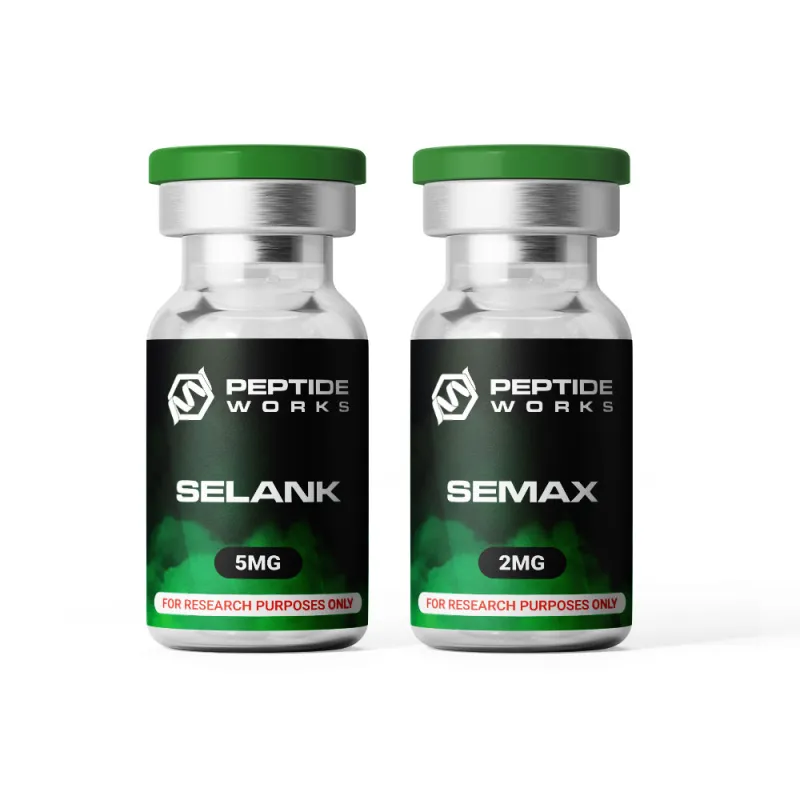When comparing Semax vs Selank, researchers explore how each peptide affects the brain and stress systems. Both are synthetic peptides with promising roles in neuroscience, but they act in different ways. Semax, derived from a fragment of adrenocorticotropic hormone (ACTH), is studied for its cognitive-enhancing and neuroprotective effects. It may influence brain-derived neurotrophic factor (BDNF) and neurotransmitters, supporting memory, learning, and mental focus in lab studies.
Selank, on the other hand, is based on the natural peptide tuftsin. Research shows it can modulate stress-related neurotransmitters and support immune function, offering insights into anxiety regulation and emotional balance.
To understand how Semax supports explicitly brain function, we look at its different roles in enhancing cognitive abilities.
Explore Semax from Peptide Works, a synthetic peptide that enhances cognitive function, boosts memory, learning, and mental focus for research studies.
How Semax Enhances Cognitive Function?

When studying Semax vs Selank, researchers often focus on how Semax supports brain function. Semax increases Brain-Derived Neurotrophic Factor (BDNF), a protein essential for learning and memory. Clinical trials shows that it boosts BDNF in the hippocampus, a region critical for cognitive processes. This action helps the brain form new connections, enhancing neuroplasticity and the ability to adapt to new information.
Compared to Selank, Semax also affects neurotransmitters such as dopamine and serotonin. These chemicals help regulate mood, motivation, and focus, which are crucial for attention and mental clarity. By influencing these systems, Semax improves memory, learning, and emotional balance.
To see the full impact of Semax, it is also important to examine its broader effects on the brain.
How Does Semax Affect the Brain?
When exploring nootropic peptides such as Semax vs Selank, researchers notice that Semax influences the brain beyond memory and learning. Studies show it can improve cerebral blood flow and oxygen delivery, supporting overall neuron health. This helps neurons receive essential nutrients and energy, allowing the brain to respond efficiently under stress.
Semax also interacts with the stress-response system by regulating the hypothalamic-pituitary-adrenal (HPA) axis. This may help modulate cortisol levels, reducing stress-related effects on the brain and mitigating chronic stress, a contrast to Selank’s primary anxiolytic effects.
Additionally, Semax demonstrates antioxidant and neuroprotective properties. It protects neurons from oxidative damage and supports synaptic signaling through pathways like PACAP and other key pathways involved in neurotrophic signaling, helping maintain healthy neural communication. These mechanisms make Semax a versatile peptide in brain research and part of advanced neurotrophin programs.
With Semax’s effects on the brain explained, it is useful to consider Selank’s role in stress and anxiety regulation.
How Does Selank Help with Anxiety and Stress?

When comparing Semax vs Selank, Selank stands out for its stress and anxiety regulation. Selank interacts with neurotransmitters like GABA and serotonin, helping calm the mind and stabilize mood. Studies show that it can reduce anxiety-like behavior in lab research and improve emotional balance under stress, findings that are relevant to anxiety disorders and neurological conditions.
Unlike Semax, which focuses on cognitive support, Selank enhances mental clarity without sedation. This makes it valuable in studies exploring natural ways to manage stress and improve mood.
Researchers also study Selank’s effect on stress-related hormones, showing that it may regulate the body’s response to stress, offering insights into anxiety management and emotional stability, which are key components of mental health and overall health.
To fully understand Selank’s potential, it is also important to examine its effects on the immune system.
Discover Selank from Peptide Works, a synthetic peptide that supports stress relief, stabilizes mood, and modulates immune function.
Does Selank Affect the Immune System?
In research comparing Semax vs Selank, Selank shows important effects on the immune system. It can modulate cytokines like Interleukin-6 (IL-6), which play a key role in immune response. This modulation helps maintain T helper cell balance and overall immune function, especially under stress.
Selank’s immunomodulatory properties make it a focus of studies linking stress and immunity. By supporting healthy immune signaling and reducing inflammation, Selank provides researchers with a tool to explore peptide-based therapies for immune health.
These mechanisms show that Selank offers dual benefits: managing anxiety and supporting the immune system. These differences make it clear why a side-by-side comparison is useful.
Semax vs Selank: Key Differences
| Feature | Semax | Selank |
|---|---|---|
| Primary Effect | Enhances cognitive function, improves memory, learning, and focus | Reduces anxiety, regulates mood, and stabilizes emotional balance |
| Neurotransmitter Targets | Dopamine, serotonin | GABA, serotonin |
| Neurotrophic Impact | Boosts BDNF, supports neuroplasticity | Supports stress-related brain pathways indirectly |
| Immune System Support | Minimal direct effect | Modulates cytokines like IL-6 and supports immune function |
| Research Focus | Cognitive studies, brain health, neuroprotection | Anxiety and stress studies, emotional stability, immune modulation |
| Sedation Risk | None | Low; non-sedative |
| Ideal Use in Research | Enhancing focus and learning in experiments | Managing stress and studying immune responses |
When looking at Semax vs Selank, Semax is better for cognitive function, memory, learning, and focus. Selank helps with stress relief, mood regulation, and immune support by affecting GABA, serotonin, and cytokines like IL-6. Both peptides work well together in research, giving scientists insights into brain function, stress regulation, and immune modulation.
After comparing their individual effects, researchers often explore the potential of combining Semax and Selank.
Semax and Selank Combination Stack

The Semax Selank Stack combines the benefits of both peptides for research studies. Semax supports cognitive function, memory, and focus, while Selank helps with stress relief, mood balance, and immune system support. Using them together allows researchers to study both brain performance and emotional regulation in a single experiment.
Researchers comparing Semax vs Selank often explore this stack to see how the two peptides interact. It provides insights into neurotransmitters, BDNF, GABA, and cytokine pathways, showing how brain function, stress response, and immune health are connected. The combination also supports cognitive performance recovery pathways and neuroplasticity relevant to cognition research.
At Peptide Works, we offer high-quality research peptides, including the Semax Selank Stack, providing labs with a convenient solution to study the synergistic effects of these peptides in neuroscience and stress-related research.
Now that the Semax Selank Stack has been explored, it’s important to understand the overall effects of Semax vs Selank and how they complement each other in research.
Check out the Semax Selank Stack from Peptide Works, combining both peptides to study cognitive enhancement, stress regulation, and immune support.
What You Should Know About Semax vs Selank
Understanding Semax vs Selank helps researchers choose the right peptide for their studies. Semax is best for cognitive enhancement, supporting memory, learning, focus, and neuroprotection. Selank, on the other hand, helps regulate stress, mood, and the immune system through its effects on GABA, serotonin, and cytokines like IL-6.
Using the Semax Selank Stack from Peptide Works allows scientists to study both brain performance and emotional balance together. This combination offers valuable insights into neurotransmitter interactions, BDNF activity, and immune modulation.
Overall, both peptides complement each other in research, providing a clear picture of brain function, stress regulation, and immune health, making them essential tools for neuroscience studies.
All products discussed are supplied for research purposes only and are not intended for human use.
References
[1] Dolotov OV, Karpenko EA, Inozemtseva LS, Seredenina TS, et al. Semax, an analog of ACTH(4-10) with cognitive effects, regulates BDNF and trkB expression in the rat hippocampus. Brain Res. 2006 Oct 30;1117(1):54-60.
[2] Dolotov OV, Karpenko EA, Seredenina TS, Inozemtseva LS, et al. Semax, an analogue of adrenocorticotropin (4-10), binds specifically and increases levels of brain-derived neurotrophic factor protein in rat basal forebrain. J Neurochem. 2006 Apr;97 Suppl 1:82-6.
[3] Volkova A, Shadrina M, Kolomin T, Andreeva L, et al. Selank Administration Affects the Expression of Some Genes Involved in GABAergic Neurotransmission. Front Pharmacol. 2016 Feb 18;7:31.
[4] Uchakina ON, Uchakin PN, Miasoedov NF, Andreeva LA, et al. [Immunomodulatory effects of selank in patients with anxiety-asthenic disorders]. Zh Nevrol Psikhiatr Im S S Korsakova. 2008;108(5):71-5.









